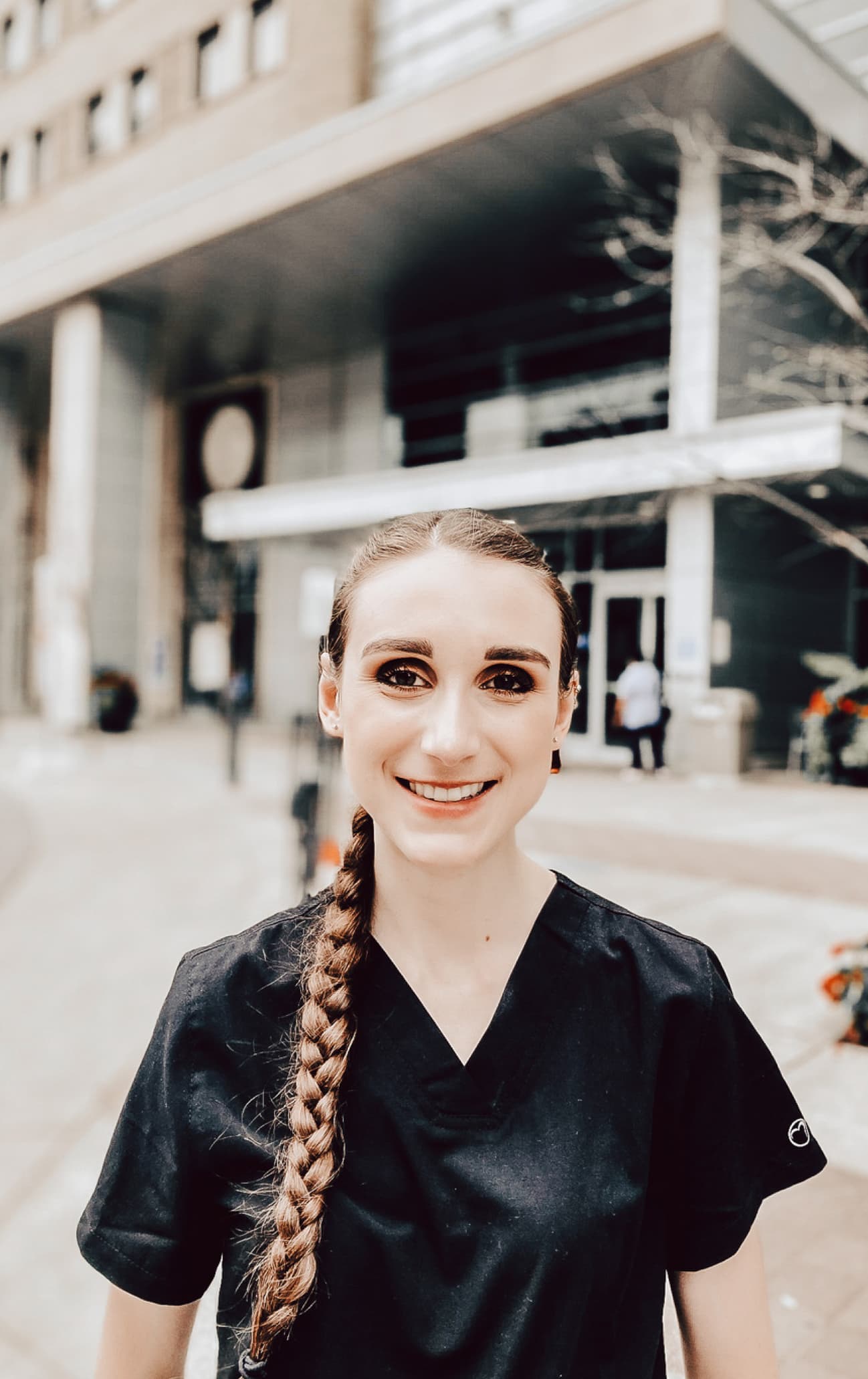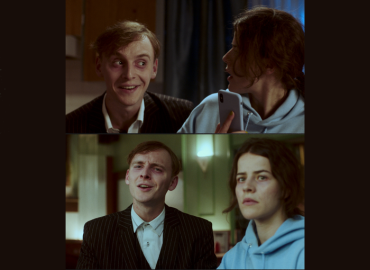Balancing a life that blends academia, medicine, and filmmaking is not an easy task, but PhD candidate Autumn Rennie has carved a unique path in which all these passions converge. As a physician in training, Autumn dedicates part of her time to volunteering and participating in immersive programs at SickKids and St. Michael's Hospital. Additionally, her PhD work and filmmaking endeavors occupy a significant portion of her life “in a great way.” She spends considerable time creating, writing, travelling, and presenting her work at academic conferences or film festivals, often creating a parallel between these two aspects of her life: “the filmmaker side of me bleeds a lot into my PhD because it is a research-creation project.” She is also actively running a production company, Exuvium Productions, while being an independent artist. Her recent film The Feast, which wrapped up in November, is currently making its way through the international festival circuit, having been selected for several festivals with more selections expected. This film employs a collaborative filmmaking methodology, which Autumn is developing as part of her PhD research. This approach uses unconventional film genres, such as horror, to encourage reflection on crucial health and societal issues.

At the IHPST, Autumn is strengthening her interdisciplinary perspective, and learning about the philosophy of medicine: “Honestly, I am still scratching the surface of it, because I don't have a philosophy background, but I believe that there are a lot of important ethical issues, issues related to the human condition, patient care, and questions of life and death. A lot of things need to be probed from a philosophical lens. I really admire what the IHPST brings in, and there is also the history piece too. The history of cinema, and the history of science and technology.”
As part of her PhD project, under the supervision of Dr. Suze Berkhout, Autumn challenges misconceptions about disability through her innovative moviemaking perspective. She addresses the pervasive stigma and stereotypes that people with disabilities continue to face in society. Her work recognizes the importance of having those with lived experience as key members of the filmmaking team, sharing in the input, and recognition themselves: “[In collaborative filmmaking], they are involved from start to finish, guiding the work and ensuring that it is authentic to their experience.” Autumn aims to subvert traditional cinematic narratives by using horror to explore important questions about the nature of disability, the patient experience, and other key issues that are often difficult to explore through traditional academic means. Genres like horror –which at their very nature, question our conceptions of reality– allows her to not only create more representative films but also to challenge and change public perceptions:
How do we play with genres that have traditionally misrepresented disability? The horror genre is one of those where there is a lot of potential. I argue that within the genre you can make important statements in an impactful way. What I'm trying to do is combine collaborative filmmaking with flipping the genre on its head, so that we can see disability in a brand-new way to empower people, to change the narrative, open up conversations, and ultimately help to break down stigma and ableism.
In the Summer of 2023, Workman Arts announced a call for emerging filmmakers to create projects about mental illness based on personal experiences. The organization aimed to shatter the stigma surrounding mental health issues, which encouraged Autumn to submit a script she had been playing with for quite some time. She was accepted into the program, which sought to provide young creatives with the opportunity to work on their projects and showcase them at the Rendezvous with Madness Festival. She presented The Feast, a horror film far away from jump scares or gore, fitting into a new sub-genre many are referring to as “elevated horror.” This genre serves as an awareness tool and a medium for advocacy, much like Jordan Peele’s Get Out, which commented on racism in the United States. This kind of horror provides creators with the ability to bring to the conversation “topics that people would normally not feel comfortable talking about like racism, eating disorders, things that are challenging like mental illness. When you are in the horror space, anything goes, you can build new realities, and question the reality that currently exists.” By embedding these themes in this type of narrative, she found a unique way to discuss them without making the conversation feel forced or out of place.

The film starts with a dark comedy tone to ease the audience in, but then it subtly transitions into something more horrific and serious, involving viewers in the same emotional experience as the characters. This structure allowed Autumn to convey the profound fear associated with eating disorders, making it more relatable even to those who have never experienced it: “That's what I tried to do with The Feast, and I'm quite happy with how it came off. Suddenly the audience is there, and they're like: ‘Wait! I thought this was a dark comedy, but now I feel like I am trapped in the same sort of experience that the character is,’ and that is what allows people to understand in a different way; in this case, what an eating disorder is like because it's very difficult if you haven't been in that position, to grasp how someone can be afraid of eating, and just how deep that fear can be.”
In her director’s statement Autumn wrote: “The Feast isn't pretty, and it's not meant to be,” this line, she says, “captures exactly what my work as a whole is.” She mentions that the topics she tackles in her projects are inherently unpleasant, which is why they are often stigmatized and avoided in conversation: “There are issues in medicine and society that are not pretty, and that is why they are not talked about, and that's why there is stigma. That is why we need to raise awareness about them, and so I am not promising anyone a pretty piece. This is not supposed to be pretty. This is supposed to open eyes and perspectives and get conversations going. And that is really my intention with everything that I do: not to create something that is an entertainment piece per se, but something that has the power to stick with people, and hopefully again, through conversation and awareness, enact change at some point.”

Audiences have reacted positively to the film, which often surprises them. Despite the widespread presence of eating disorders, body image issues, and mental health in modern media and social discourses, The Feast portrays them in an unexpected light: “I find that often the air gets sucked out of the room for a moment, because it's just not something they have seen before or that they are expecting at a number of the festivals.” One memorable moment occurred at the 2024 University of Toronto Film Festival. Autumn had been working a shift in the emergency department and arrived after the screening of her submission. She sat through the other films, wondering how people had reacted during the movie. Later it was announced that it had won several awards. She describes the experience saying: “There is a moment when you are sitting there, having self-doubt, and then, at the end, to have that recognition and the affirmation that you're on the right path, that this is actually touching people and making sense. It was a special moment. I appreciated that, especially that it was right here at U of T, that was on home territory.” Autumn believes that other students with creative talents can carve out a path for themselves, and she encourages “other artists, not just filmmakers, but artists in general who want to combine their artistic practice with medicine or other scholarship, to find that opportunity and space to do so.”
Currently, besides attending the festival circuit with The Feast, Autumn is working on several other films. One of them is a documentary funded by a grant from the University of Toronto Scarborough's Center for Global Disability Studies, which is now in the post-production phase. This project highlights the journeys of three exceptional artists —a painter, a theatre performer, and a musician— showcasing their work and discussing how to make our world more accessible. Another project, in collaboration with York University, focuses on the lived experiences of brain injury survivors. Partnering with her co-supervisor Dr. Denielle A. Elliot, they aim to bring the experiences of these individuals to the screen to raise awareness about living with a traumatic brain injury. Additionally, as a creative interlude, Autumn is working on proof of concept for a television series titled ‘All in Baby,’ about a financially struggling medical student who becomes a poker star.


